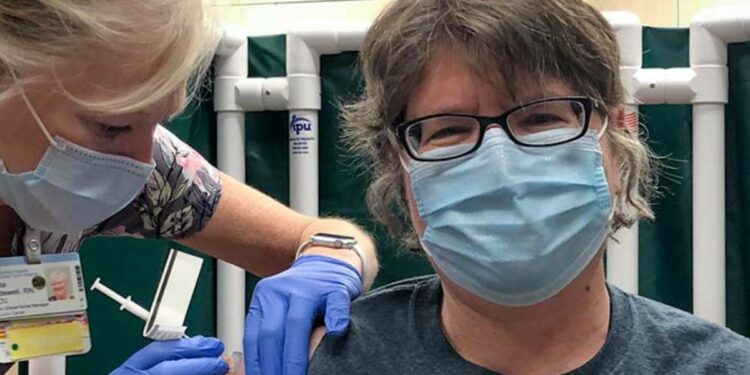Born in New York, Dr Wu’s obsession with the immune system began after she watched bone marrow transplants as a medical intern and saw firsthand how they regenerated the blood and immune system to tackle cancer.
‘I had had really formative academic experiences that made me quite interested in the power of immunology,’ she told CNN.
‘There in front of my eyes were people who are being cured of their leukemia because of the mobilization of immune response.’
The idea of a cancer vaccine has been around for many years, but previous attempts have often failed because researchers haven’t found the correct target.
Dr Wu was able to unearth the key to making cancer vaccines work. Along with her team, she discovered how to identify tumor’s unique neoantigens.
These are proteins that form on cancer cells when mutations occur.
These tumor neoantigens can be identified by the immune system’s T cells as foreign, and then attacked.
Dr Wu identified patients’ neoantigens by sequencing DNA from healthy cells and cancer cells.
Copies of the neoantigens were then inserted into a customized vaccine to trigger the immune system to attack the cancer cells.
Dr Wu was determined to test the technology in advanced melanoma patients in a trial.
The FDA found it difficult to grasp the idea that each person in the trial would get a unique vaccine. Normally, they’d insist on testing the vaccine in animals before moving forward.
Dr Wu said: ‘That room was packed. It was the first [trial] of its kind, and there were people from many different offices. Our argument was, “This is personalized, whatever we do in an animal doesn’t really match the human — so why even go that route?”‘
Once they had secured FDA approval, six advanced melanoma patients were vaccinated with a seven-shot course of individualized neoantigen vaccines.
The groundbreaking results, published in Nature in 2017, showed that some of the patients’ immune cells had been activated and their tumor cells targeted.
Four years later, a follow-up in 2021 demonstrated that the immune responses had worked to keep the cancer cells at bay.
Dr Wu said: ‘I’m grateful for all the patients that participated in our trial because they are… active partners.
‘It’s hard enough to go through treatment, but then to go through treatment that is of unknown benefit, and to be able to be willing to come in for all the extras that we need to do this type of research. There are more tests, there are more blood draws, there are more biopsies.’
Dr Wu and her team, as well as other big pharma companies like Merck and Moderna, have delved further into cancer vaccine research.
Trials are now in motion for pancreatic and lung cancer.
Dr Wu said: ‘My belief is that there are many roads to Rome. I think there’s many different delivery modalities, but each delivery approach can be optimized with different bells and whistles.
‘There has to be investment in and how to make that delivery approach work the best. And right now there’s a huge appetite for mRNA you know, fed by our pandemic.’
mRNA vaccines deliver instructions to cells to create the right proteins and contain a small piece of a protein from the cancer cell.
Meanwhile, a new therapy class has been hailed as a breakthrough in cancer treatment.
Similarly to cancer vaccines, tumor-infiltrating lymphocytes (TIL) uses immune cells from a patient’s tumors to kickstart a long-term defense.
Last week, the FDA approved a TIL for advanced melanoma called Amtagvi.
The medicine is given through a vein in the hospital. It works by taking T cells, a type of white blood cell, from the patient’s tumor and then making more of them.
Patrick Hwu, CEO of Moffitt Cancer Center, told Axios: ‘This is the tip of the iceberg of what TIL can bring to the future of medicine.’









